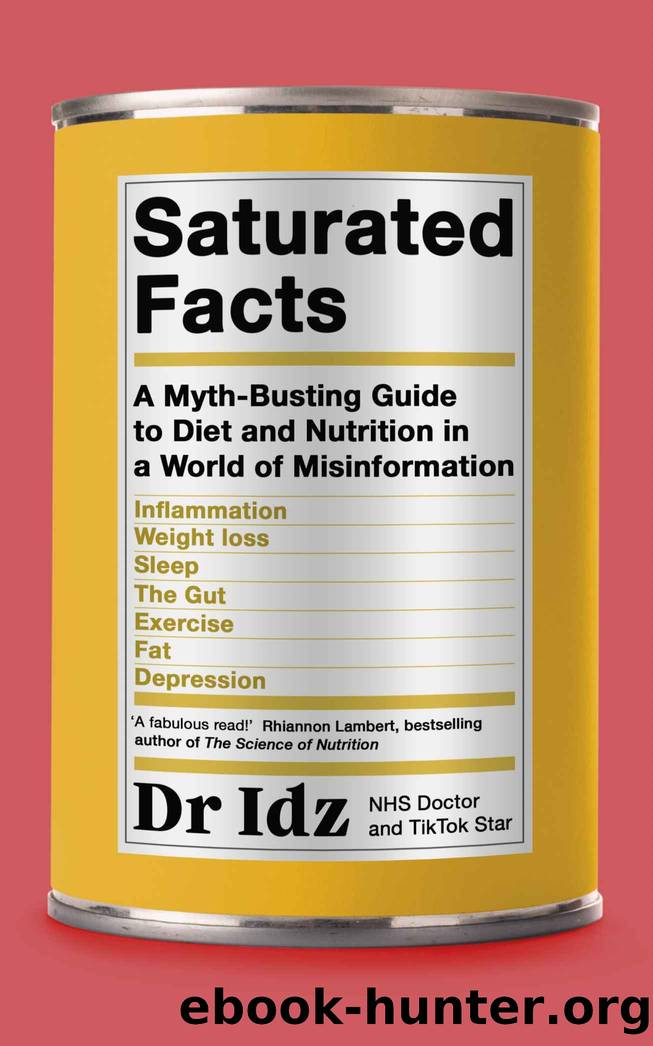Saturated Facts by Dr Idrees Mughal

Author:Dr Idrees Mughal [Mughal, Dr Idrees]
Language: eng
Format: epub
ISBN: 9780241588239
Publisher: Penguin Books Ltd
Published: 2024-03-14T04:00:00+00:00
Inflammatory bowel disease
Inflammatory bowel disease (IBD) is a common, chronic, immune-mediated disease affecting the gastrointestinal tract. In the United States, it is estimated that over 3 million adults (1.3 per cent of the population) have been diagnosed with IBD as of 2015. IBD consists of two subtypes: ulcerative colitis and Crohnâs disease. Itâs not exactly clear why IBD arises, but genetics, environmental factors and having an altered microbiota all play a role.
There are several mechanisms by which a typical Western diet can increase the risk of IBD and colorectal cancer. The consumption of an animal-based, high-saturated-fat and no-fibre diet has been shown in controlled human trials to rapidly shift microbial composition.40 In one study, researchers prepared two diets: a plant-based diet rich in grains, legumes, fruits and vegetables; and an animal-based diet comprising meats, eggs and cheese. They saw that the animal-based diet increased the numbers of bile-tolerant organisms (Bilophila and Bacteroides) and decreased levels of helpful Firmicutes. Enhanced activity of Bilophila microbes can lead to pro-inflammatory bacterial species, along with nitrogenous metabolites â together, these can induce intestinal inflammation and the growth of cancerous cells.41
Here are two key nutrients that can improve the composition of the gut microbiota and help those with IBD:
Omega-3 fatty acids may improve quality of life for people with IBD by helping to stabilize the disease. Studies have found that mice â which are prone to gut inflammation (colitis) and consuming a high-fat diet â saw a reduction in the growth of harmful bacteria B. wadsworthia when fed fish oils. This led to a reduced likelihood of developing colitis.42 The most comprehensive meta-analysis of eighty-three RCTs in humans, looking specifically at polyunsaturated fats on inflammatory bowel disease, found that omega-3s may reduce the risk of IBD relapse and worsening of symptoms, yet didnât significantly alter systemic inflammatory markers.43
Vitamin D is perhaps of greater interest, as trials in patients with Crohnâs disease show that each 1ng/mL increase in plasma vitamin D levels leads to a 8 per cent reduction in the risk of colorectal cancer.44 Supplementing with 1200IU/d of vitamin D3 for a year reduced the risk of relapse from 29 per cent to 13 per cent, and a high dose of 10,000IU/d appears to reduce the rate of relapse even further.45 These effects are seen due to vitamin Dâs ability to increase antimicrobial activity (e.g. facilitating macrophages in killing E. coli), maintain the integrity of the intestinal lining and prevent harmful shifts in bacterial species, which in turn inhibits inflammatory processes.46 Depending on baseline levels, supplementing with 2,000â10,000IU/d of vitamin D to achieve a plasma level of >50ng/mL appears to be beneficial in managing IBD and improving gut functionality. But what should you do if you experience a flare-up of IBD?
Download
This site does not store any files on its server. We only index and link to content provided by other sites. Please contact the content providers to delete copyright contents if any and email us, we'll remove relevant links or contents immediately.
How to Be a Bawse: A Guide to Conquering Life by Lilly Singh(7472)
Deep Work by Cal Newport(7068)
The Longevity Diet by Valter Longo(5058)
The Fat Loss Plan by Joe Wicks(4908)
The Four-Pack Revolution by Chael Sonnen & Ryan Parsons(3974)
The Ultimate Bodybuilding Cookbook by Kendall Lou Schmidt(3940)
The French Women Don't Get Fat Cookbook by Mireille Guiliano(3659)
Not a Diet Book by James Smith(3411)
Super Food Family Classics by Jamie Oliver(3409)
Factfulness_Ten Reasons We're Wrong About the World_and Why Things Are Better Than You Think by Hans Rosling(3235)
Turn Up Your Fat Burn! by Alyssa Shaffer(3216)
Self-Esteem by Matthew McKay & Patrick Fanning(3142)
Tom Kerridge's Dopamine Diet: My low-carb, stay-happy way to lose weight by Kerridge Tom(3106)
Body Love by Kelly LeVeque(3053)
The Unbecoming of Mara Dyer by Michelle Hodkin(3041)
Tone Your Tummy Type by Denise Austin(2837)
The Fat Chance Cookbook by Robert H. Lustig(2832)
LL Cool J's Platinum 360 Diet and Lifestyle by LL Cool J(2732)
Men's Health Best by Men's Health Magazine(2598)
